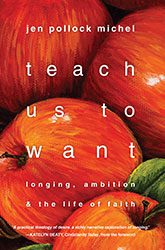 If, as Madeleine L’Engle has written, a book “can be a star, ‘explosive material, capable of stirring up fresh life endlessly,’ a living fire to lighten the darkness, leading out into the expanding universe,” then Jen Pollock Michel’s first book—Teach Us To Want: Longing, Ambition & The Life of Faith—certainly makes the cut. Michel’s goal—to establish and explore a theology of desire—is decidedly academic. And yet, her ability to weave personal anecdote with scripture and the depth and breadth of her sources—quoting as adeptly from Augustine and Aristotle as H.G. Wells and Annie Dillard as N.T. Wright and Dietrich Bonhoeffer—is more akin to poetry.
If, as Madeleine L’Engle has written, a book “can be a star, ‘explosive material, capable of stirring up fresh life endlessly,’ a living fire to lighten the darkness, leading out into the expanding universe,” then Jen Pollock Michel’s first book—Teach Us To Want: Longing, Ambition & The Life of Faith—certainly makes the cut. Michel’s goal—to establish and explore a theology of desire—is decidedly academic. And yet, her ability to weave personal anecdote with scripture and the depth and breadth of her sources—quoting as adeptly from Augustine and Aristotle as H.G. Wells and Annie Dillard as N.T. Wright and Dietrich Bonhoeffer—is more akin to poetry.
Michel begins by (rightly, I believe) noting how challenging it is for contemporary Christians to navigate their desires. On the one hand, our churches often teach the necessity of reigning in, controlling, and extinguishing desire. On the other, our culture glorifies the indulgence of desire, suggesting that desires of all ilk are worthy and acceptable. And yet, Michel argues, a careful reading of scripture seems to offer us a third option: desire that is godly; desire that is holy.
In each chapter, Michel offers a way of correcting our misconceptions about desire or a method of living beyond the rejection of desire, an action point to help us allow our desires to be shaped by God’s will. Using desire in her own life—in particular the desire to write despite what long appeared to be her conflicting role as a mother to five children—as an example, she leads her readers to reconsider our fear of desire and to let courage, grace, and the Gospel itself be our guides instead. By staying committed to the practices of scripture reading, prayer, confession, and community, we can ensure not only that our deepest and most heartfelt desires are recognized and fulfilled but that they become more than we might have ever imagined as they are boldly shaped by God’s will and plan for our lives.
Perhaps one of the most profound moments of revelation for me in this book (and there were many such moments) was Michel’s exegesis of the Lord’s Prayer, in which she leads us to the truths that we should not give in to the pressures of the world to see grace as based often or even primarily in our deeds, desire as solely appropriate for spiritual subjects, and the “self” as the sovereign force behind the fulfillment of desire. These points may seem obvious when spelled out in this way and are certainly the sorts of theological truths that will garner instant head-nodding from evangelicals at least, but Michel pushes us over and over again to ask how well we are doing at putting theory into practice. Are we desiring, for example, our daily bread? Do we really believe it is good and worthy to pray sincerely and actively and persistently for God to, say, find us our dream home? Or do we feel foolish praying for bread when we live in a culture of feasting? And do we feel selfish praying for material blessings when we already have so much? If so, Michel suggests we might do well to see both sides of the spectrum through God’s eyes. Ultimately, she makes the point that God is a god of great blessings. He DESIRES to bless us, He PROMISES to bless is, He REVELS in blessing us. But this is no prosperity gospel she is preaching. The flip side of the coin is how well we are willing to release our desires to God. Are we afraid to acknowledge and speak them? Are we afraid they won’t be acceptable? Or can we freely and whole-heartedly hand over every single one of them with open hands to a God Whom we can trust to handle them?
Teach Us To Want will, at the very least, get you thinking. It likely will get you searching scripture and considering your own thoughts about desire as well. It may even revolutionize and liberate your entire walk as a Christian. To be human is to desire. As Michel points out, the very first sin was one of misplaced and misused desire. We have struggled with desire from the get-go and can likely, as this text makes clear, not give up or grow lazy in continuing to approach it and confront it head on, both in our theology and in our lives.
 Amber M. Stamper holds a Ph.D. in English (Rhetoric and Composition) and is an Assistant Professor of Language, Literature, and Communication at Elizabeth City State University in North Carolina. Her research and publications center on religious rhetoric and communication, especially issues of Christian evangelism and the digital church
Amber M. Stamper holds a Ph.D. in English (Rhetoric and Composition) and is an Assistant Professor of Language, Literature, and Communication at Elizabeth City State University in North Carolina. Her research and publications center on religious rhetoric and communication, especially issues of Christian evangelism and the digital church












